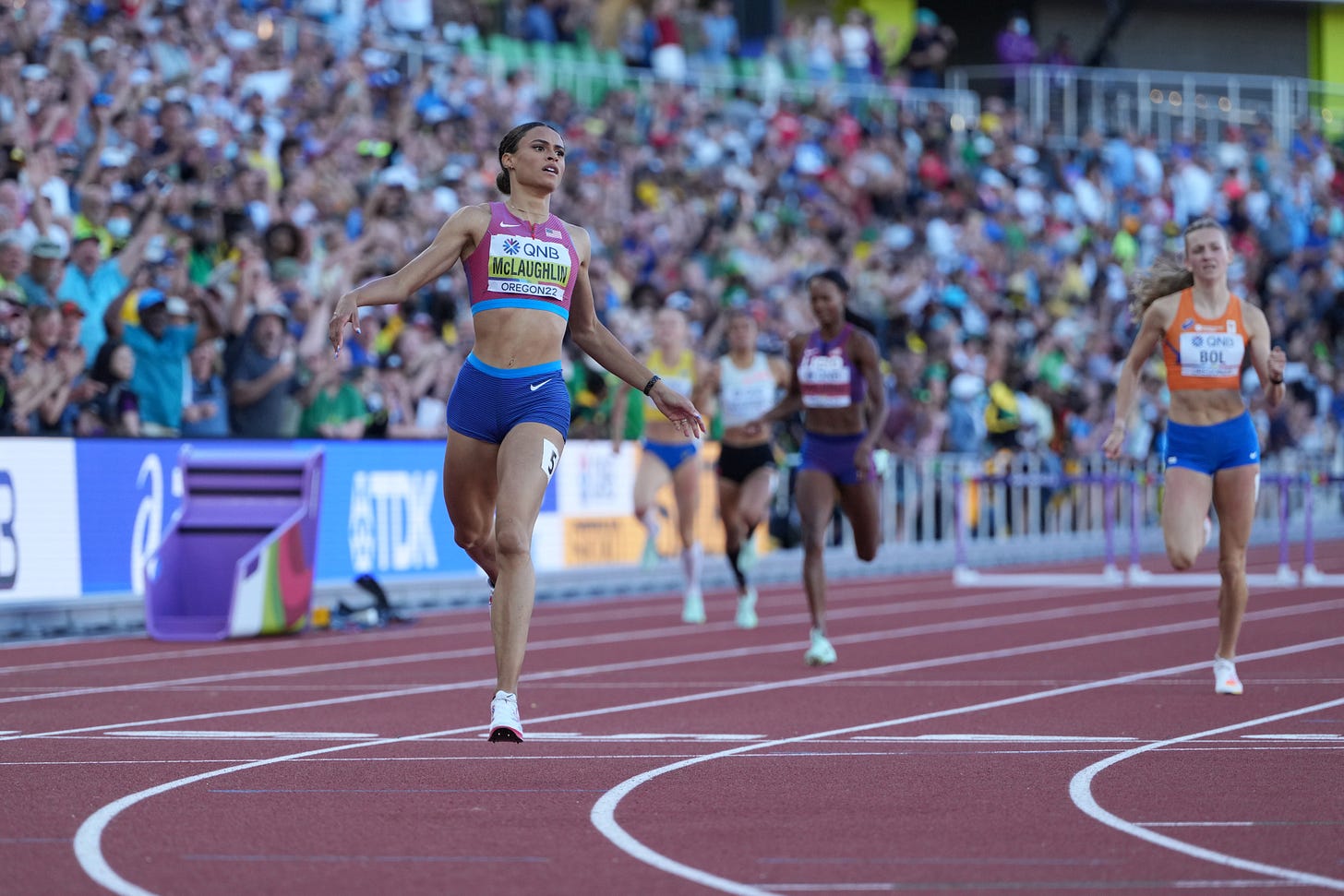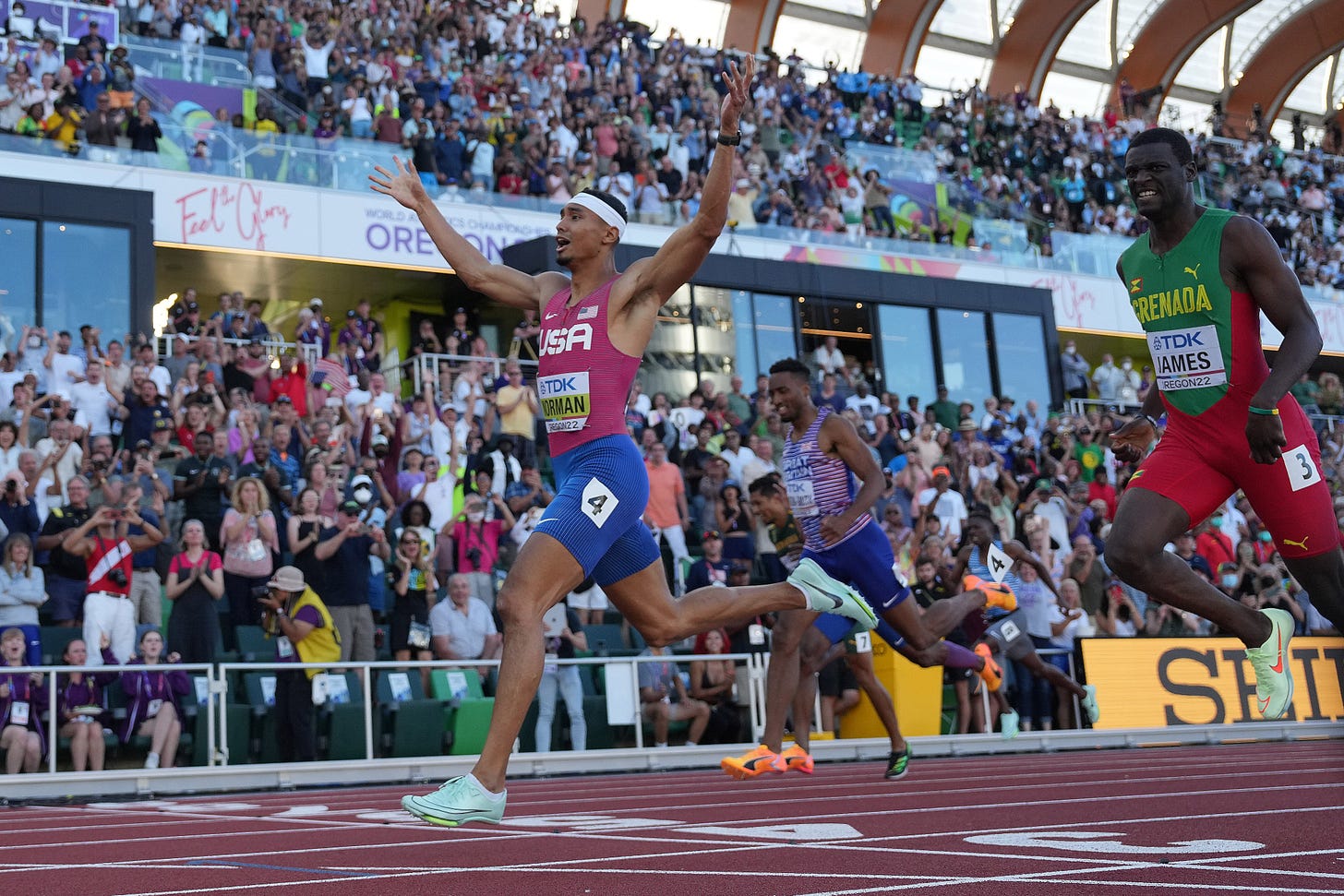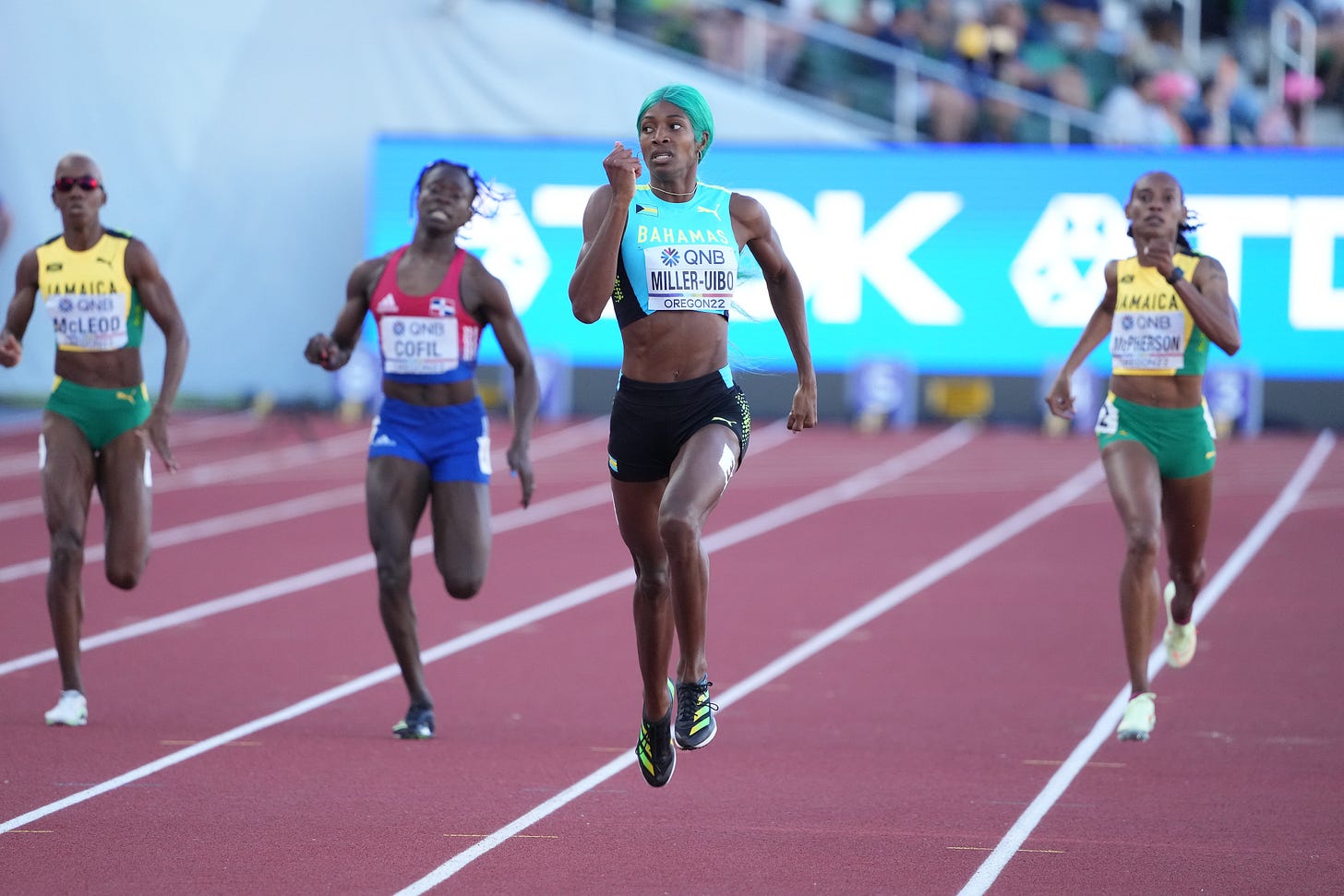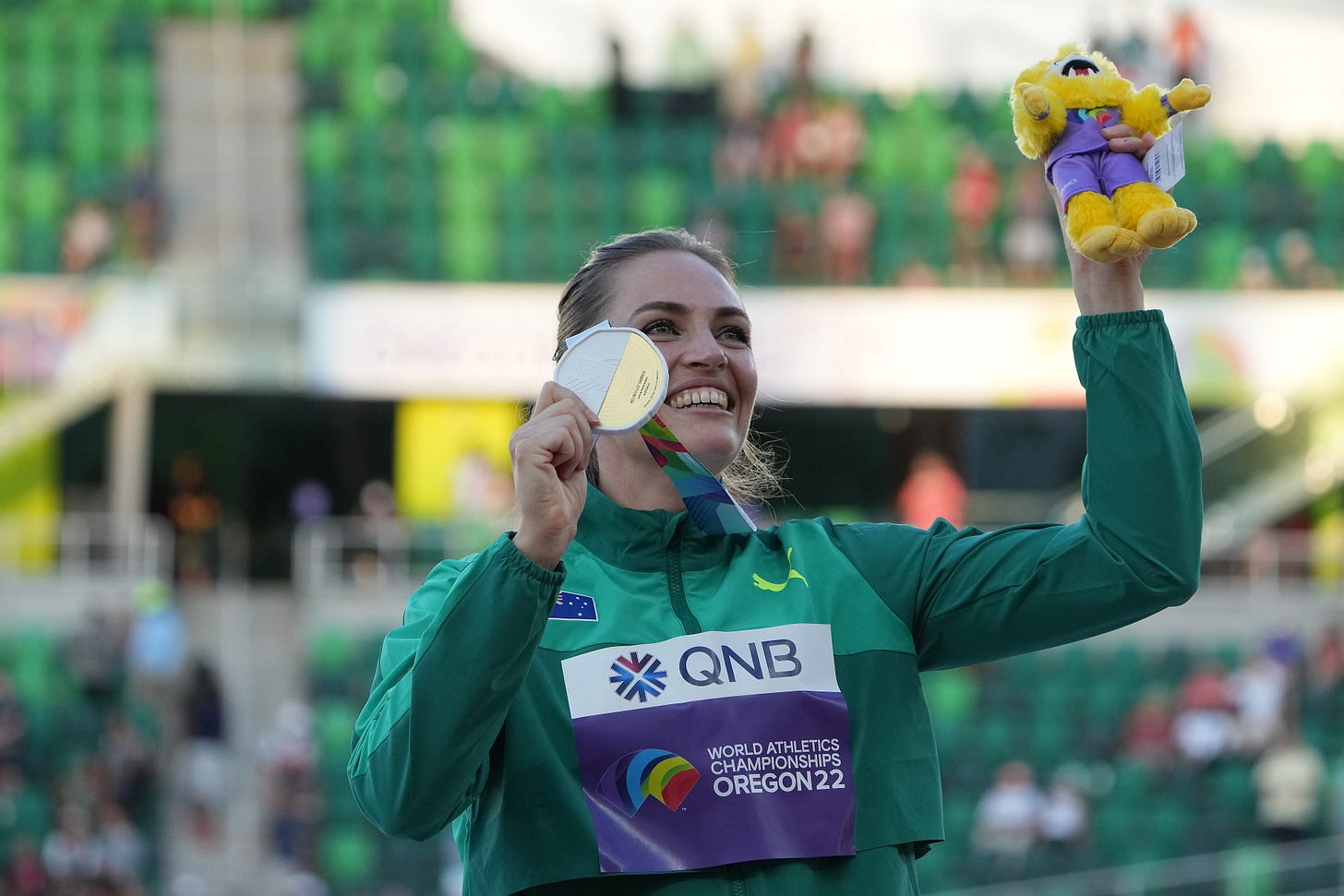McLaughlin breaks barrier in 400-meter hurdles victory
22-year-old American becomes first woman to run under 51 seconds in the event

EUGENE, Oregon – Contrary to what our stopwatches might be telling us, Sydney McLaughlin is human.
That was evident on Friday evening shortly after she had become the first woman in history to break 51 seconds in the 400-meter hurdles in the World Athletics Championships at the University of Oregon’s Hayward Field.
McLaughlin’s time of 50.68 seconds – which was faster than what two finalists ran in the women’s 400 final sans hurdles 35 minutes earlier – obliterated the world record of 51.41 she had set in winning the USA Track & Field Outdoor Championships on June 25 and gave her a staggering margin of victory of 1.59 seconds over Olympic bronze medalist Femke Bol of the Netherlands.
But that wonderful performance – which concluded the eighth day of competition in the 10-day World Championship meet – took enough out of her that she dropped into a catchers’ position seconds after crossing the finish line and then transitioned to sitting on the track with her knees drawn up and arms locked around them.
She appeared to wave off a request to conduct a post-race interview over the public address system three or four minutes after the race, and when the interview began a few minutes after that, the interviewer was on her knees as McLaughlin had yet to stand up.
“Unreal,” was the concise answer she gave when asked what she thought after seeing her time displayed on a video display board on the infield of the track.
When the interviewer asked her what she was thinking when she entered the home straightaway with a huge lead, she replied that she “just wanted to really go for it. Obviously, that last 100 really hurt.”
McLaughlin, 22, who had to reel in fellow American Dalilah Muhammad in the home straightaway when she set her first two world records of 51.90 and 51.46 last summer, took the lead after the first of 10 hurdles on Friday and was never seriously challenged after that. She was the first competitor to clear the second hurdle and her lead got progressively larger with each passing barrier.
Muhammad, the two-time defending World champion, and Bol were closest to McLaughlin as she swept into the home straightaway, but they still trailed her by 10-12 meters. And the lead only got bigger as McLaughlin cleared the final two barriers of the race before focusing her attention on getting across the finish line.
Bol ran 52.27 – which tied her season best – in second place, ahead of the U.S. trio of Olympic silver medalist Muhammad (53.13), Shamier Little (53.76), and Britton Wilson (54.02).
McLaughlin has made such rapid progress in the 400 hurdles that her winning time on Friday was 1.22 seconds faster than what she ran in winning the U.S. Olympic Trials on June 27 of last year. That was the first race in history in which a woman ran under 52 seconds in the 400 hurdles, but McLaughlin has dipped under that once insurmountable barrier four times since then.
She has now run the three fastest times in history, five of the top six, and seven of the top 11. However, she said the 50.68 clocking was far from a technical masterpiece.
“I think there’s always more to improve upon,” she told World Athletics. “There’s always more that can be shaved off, for sure. There’s no such thing as a perfect race, but I don’t think that was a super-clean race.”
Ato Boldon, a track and field commentator for NBC Sports and a former World Championship sprinter for Trinidad and Tobago said during a recent broadcast that McLaughlin’s coach, Bobby Kersee, has talked about broadening her one lap horizons and setting her sights on breaking the word record of 47.60 in the 400 that was set by Marita Koch of East Germany in 1985. But McLaughlin said nothing has been decided.
“There’s talk of doubles, talk of switching,” she said. “Honestly, I have no clue.”
In addition to the women’s 400 hurdles, finals were also conducted in the men’s 400 meters, women’ 400, women’s javelin, and women’s 35-kilometer walk on Friday.
Favorite Michael Norman of the U.S. won the men’s 400 meters after winning a hard-fought homestretch duel with Kirani James of Grenada, Matthew Hudson-Smith of Great Britain, and Wayde van Niekirk of South Africa.
Norman’s season best of 43.56 was significantly faster than those of James (44.02), Hudson-Smith (44.38), and van Niekirk (44.58) entering the meet. But that trio was shadowing him as they entered the home straightaway, and James actually had a small lead.
However, the 24-year-old Norman drew even with James with 80 meters remaining and then began to gradually inch away from him. It was not easy, and it was not graceful as Norman tensed up in his effort to win. But he had a clear margin of victory when he crossed the finish line in 44.29, followed by James (44.48), Hudson-Smith (44.66), fast-closing American Champion Allison (44.77), and van Niekirk (44.97).
The victory came nearly a year after Norman had finished a disappointing fifth in the Olympic Games after winning the U.S. Olympic Trials.
“It took a lot of work to get to where I was,” he said. “Obviously last year was not a good year for me so I had to do a lot of hard work just to kind of get back to where I was. This moment here is going to be remembered forever.”
James, 29, has now won one gold, one silver, and one bronze medal in the 400 in both the World Championships and the Olympic Games.
The victory by Norman capped a great meet for the U.S. men in the individual sprint and hurdle events as they won four of five gold medals and 11 of a possible 15 medals overall.
In comparison, the U.S. won four silver medals and one bronze medal in those same events in the Olympics.

Favorite Shaunae Miller-Uibo of the Bahamas won her first World title in the women’ 400 after winning Olympic championships in 2016 and last summer.
Olympic silver medalist Marileidy Paulino of the Dominican Republic had the fastest time of the year entering the meet and she had beaten Miller-Uibo in a Diamond League meet in Doha, Qatar, in May. But the 6-foot-1 Miller-Uibo dominated the race on Friday as she took a clear lead after the first 200 meters and was never seriously challenged after that.
She eased up in the final few strides of the race, but still had a comfortable margin of victory when she crossed the finish line in 49.11. Paulino placed second in 49.60 and Sada Willians of Barbados finished third in 49.75.

Kelsey-Lee Barber of Australia easily won her second consecutive title in the women’s javelin, but the other medals were not decided until the sixth round.
The Olympic bronze medalist’s winning throw of 66.91 meters (219 feet 6 inches) was nearly three meters better than the 64.05 (210-1) best of silver medalist Kara Winger of the U.S. But Winger was ecstatic with her silver medal-winning performance as that effort had vaulted her from fifth to second on her sixth – and final – throw of the competition.
Shortly before that, Haruka Kiraguchi of Japan had temporarily moved from fifth place to second with a throw of 63.27 (207-7).
Winger’s silver medal capped a very good performance for U.S. women in the throwing events as they won the shot put, placed first and third in the hammer throw, second in the javelin, and third in the discus.

In a final that started at 6:15 a.m., Pacific time, the women’s 35-kilometer walk was contested for the first time in the World Championships.
However, the top three finishers were the same as in the 20-kilomeer walk that was held on July 15.
Kimberly Garcia Leon of Peru and Katarzyna Zdzieblo of Poland shared the lead through the first 15 kilometers of the race, but Garcia Leon had an 11-second lead on Zdzieblo at the 20-kilometer mark.
Zdzieblo cut her deficit to seven seconds after 25 kilometers, but Garcia Leon’s lead had grown to 21 seconds at 30 kilometers, and it was 47 seconds when she crossed the finish line in 2 hours 39 minutes 16 seconds.
Zdzieblo clocked 2:40:03, followed by China’s Shijie Qiewang in 2:40:37.
In the semifinals of the women’s 800 meters, Olympic champion Athing Mu of the U.S., Olympic silver medalist Keely Hodgkinson of Great Britain, and Mary Moraa of Kenya each won their qualifying heats.
Mu clocked 1 minute 58.12 seconds, Hodgkinson ran 1:58.51, and Moraa timed 1:59.65.
Olympic bronze medalist Raevyn Rogers of the U.S. and World indoor champion Ajee Wilson of the U.S. were amongst the five other qualifiers for the final, which will be held at 6:35 p.m. on Sunday.
Notable non-qualifiers were defending World champion Halimah Nakaayi of Uganda and Olympic fourth-place finisher Jemma Reekie of Great Britain.
Twelve competitors advanced to the final of the men’s pole vault by clearing 5.75 (18-10¼).
Olympic champion Mondo Duplantis of Sweden, silver medalist Chris Nilsen of the U.S., and bronze medalist Thiago Braz of Brazil were three of four vaulters who cleared 5.75 on their first attempts. The other was Oleg Zernikel of Germany.
The U.S. had the top qualifying times in both the men’s and women’s 400 relays.
The U.S. men’s team of Christian Coleman, 200 champion Noah Lyles, Elijah Hall, and 100 silver medalist Marvin Bracy ran 37.87.
Fred Kerley, who led the U.S. to a 1-2-3 finish in the 100 on July 16, sustained a quadriceps injury in a 200-meter semifinal earlier this week and will not be available for relay duty.
The U.S, women’s squad of Melissa Jefferson, Aleia Hobbs, Jenna Prandini, and Twanisha Terry ran 41.56.
Jamaica advanced to the final with a second-place time in its heat, but will be heavily favored today when 100 champion Shelly-Ann Fraser-Pryce, 200 champion Shericka Jackson, and Elaine Thompson-Herah are all expected to run.





Your podcast is the first one that comes up on my I pad. Your reporting is on par and more complete than the AP. Keep up the good work. Russ